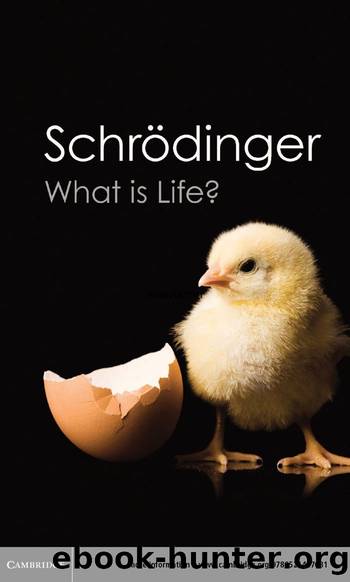What Is Life (Canto Classics) by Erwin Schrodinger

Author:Erwin Schrodinger
Language: eng
Format: mobi
Tags: Biographies & Memoirs, History & Philosophy, Reference, Science & Math, Worship & Devotion, Spirituality, Inspirational, Religion & Spirituality, Physics, Biography
ISBN: 9781107604667
Publisher: Cambridge University Press
Published: 2012-03-25T16:00:00+00:00
ETHICS
Even without this last generalization, which to me is very important but may still seem rather dubious to others, the theory of consciousness that I have adumbrated seems to pave the way towards a scientific understanding of ethics.
At all epochs and with all peoples the background of every ethical code (Tugendlehre) to be taken seriously has been, and is, self-denial (Selbstüberwindung). The teaching of ethics always assumes the form of a demand, a challenge, of a âthou shaltâ, that is in some way opposed to our primitive will. Whence comes this peculiar contrast between the âI willâ and the âthou shaltâ? Is it not absurd that I am supposed to suppress my primitive appetites, disown my true self, be different from what I really am? Indeed in our days, more perhaps than in others, we hear this demand often enough mocked at. âI am as I am, give room to my individuality! Free development to the desires that nature has planted in me! All the shalls that oppose me in this are nonsense, priestsâ fraud. God is Nature, and Nature may be credited with having formed me as she wants me to be.â Such slogans are heard occasionally. It is not easy to refute their plain and brutal obviousness. Kantâs imperative is avowedly irrational.
But fortunately the scientific foundation of these slogans is worm-eaten. Our insight into the âbecomingâ (das Werden) of the organisms makes it easy to understand that our conscious life â I will not say shall be, but that it actually is necessarily a continued fight against our primitive ego. For our natural self, our primitive will with its innate desires, is obviously the mental correlate of the material bequest received from our ancestors. Now as a species we are developing, and we march in the front-line of generations; thus every day of a manâs life represents a small bit of the evolution of our species, which is still in full swing. It is true that a single day of oneâs life, nay even any individual life as a whole, is but a minute blow of the chisel at the ever unfinished statue. But the whole enormous evolution we have gone through in the past, it too has been brought about by myriads of such minute chisel blows. The material for this transformation, the presupposition for its taking place, are of course the inheritable spontaneous mutations. However, for selection among them, the behaviour of the carrier of the mutation, his habits of life, are of outstanding importance and decisive influence. Otherwise the origin of species, the ostensibly directed trends along which selection proceeds, could not be understood even in the long spaces of time which are after all limited and whose limits we know quite well.
And thus at every step, on every day of our life, as it were, something of the shape that we possessed until then has to change, to be overcome, to be deleted and replaced by something new. The resistance of our primitive will is the psychical correlate of the resistance of the existing shape to the transforming chisel.
Download
This site does not store any files on its server. We only index and link to content provided by other sites. Please contact the content providers to delete copyright contents if any and email us, we'll remove relevant links or contents immediately.
Sapiens: A Brief History of Humankind by Yuval Noah Harari(14358)
Sapiens by Yuval Noah Harari(5363)
Pale Blue Dot by Carl Sagan(4994)
Homo Deus: A Brief History of Tomorrow by Yuval Noah Harari(4897)
Livewired by David Eagleman(3762)
Origin Story: A Big History of Everything by David Christian(3680)
Brief Answers to the Big Questions by Stephen Hawking(3421)
Inferior by Angela Saini(3310)
Origin Story by David Christian(3192)
Signature in the Cell: DNA and the Evidence for Intelligent Design by Stephen C. Meyer(3123)
The Gene: An Intimate History by Siddhartha Mukherjee(3091)
The Evolution of Beauty by Richard O. Prum(2992)
Aliens by Jim Al-Khalili(2824)
How The Mind Works by Steven Pinker(2811)
A Short History of Nearly Everything by Bryson Bill(2681)
Sex at Dawn: The Prehistoric Origins of Modern Sexuality by Ryan Christopher(2512)
From Bacteria to Bach and Back by Daniel C. Dennett(2477)
Endless Forms Most Beautiful by Sean B. Carroll(2471)
Who We Are and How We Got Here by David Reich(2430)
